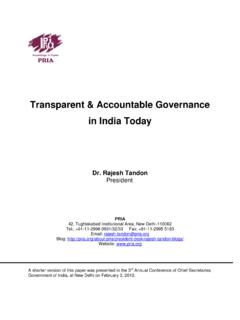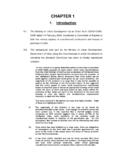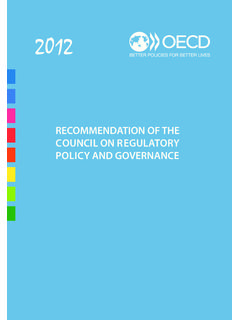Transcription of The Role of Citizens in Democratic Governance
1 The Role of Citizens in Democratic Governance Aditi Dayal*. Abstract This paper seeks to answer the question as to why some governments are more stable, efficient, innovative and well-managed than others. It locates the answer in the shift of paradigm from a Governance model in which Citizens were mostly passive to one in which they are provided with power and avenues to influence public affairs that affect their individual and community life. Citizen centric administration (CCA), as the new approach is popularly known, is based on the idea of active citizenship and the way it affects the organisation and control of public services in our communities. CCA builds on the existing social capital in communities to make Citizens sophisticated consumers of politics, ones who interact with the government based on who they are and what their needs are and not based on the way government is organised.
2 The interplay between social capital, exemplified in many grassroots as well as corporate organisations, and CCA holds tremendous potential for enhancing Citizens ' participatory role in Governance . I. Introduction The strategy of active citizenship and its implications for the way we organize and control public services for and within our communities, is both a subject of increasing relevance to the Citizens as well as a phenomena of ever-greater importance in political and social life in India. The role of the public in shaping communities of the future has long been emphasised in discussions on the good Governance ' paradigm. The image of Citizens joining together in Governance has been the dream of advocates of Democratic self-government.
3 The concept of citizen-centric Governance represents the quintessential idea of democracy. India is the world's largest democracy and, by comparative standards, a well-functioning one at that. India's Democratic experience till now has ascertained that good Governance must necessarily aim at an expansion of social opportunities and removal of poverty. Governance must aim at securing justice, transparency and accountability, empowerment, employment and efficient delivery of The Indian State does not have monopoly over the public sphere and the civil society * Aditi Dayal is a PhD candidate at Jawaharlal Nehru University, New Delhi. She specialises in issues of democracy and development in South Asia. 1 Balmiki Prasad Singh.
4 The Challenge of Good Governance in India: Need for Innovative Approaches'. Second International Conference of the Global Network of Global Innovators. Ash Institute for Democratic Governance and Innovation and John F. Kennedy School of Government, Harvard University. 31 March- 02 April. 2008. is increasingly more concerned with the public sphere while considering intervention of government critical for provision of welfare schemes to cover social safety needs. The agenda for Citizen Centric Administration was set by the Conference of the Chief Ministers of Indian States in May 1997 in order to ensure effective and responsive administration, one that gears itself toward progressive effectiveness in the delivery of basic and essential services.
5 However, citizen-responsive Governance relies not only on supply of efficient public service delivery from the government to Citizens but equally on the demand for responsive public authorities on part of the Citizens . The Indian government has realised this interface between pubic authorities and Citizens . The Ninth and Twelfth Reports of the Administrative Reforms Committee, titled Social Capital- A Shared Destiny' and Citizen Centric Administration- The Heart of Governance ' respectively, focus on these parallel concerns. This paper looks at the interplay between social capital and citizen-centric Governance in India. II. Unbundling Citizen Centric Governance Citizen centric Governance has long been a part of deliberations in the public domain in India.
6 The traditional paradigm of the political system provides for linkages to Citizens primarily through electoral politics, public opinion polls, customer satisfaction surveys, public hearings, organised group activities, and individual contacts. Public consultation and deliberation among Citizens and between Citizens and government in the traditional paradigm has been largely passive. Early nineteenth century onwards, franchise was extended to previously excluded sections of population, particularly in the western world. However, the role of the citizen as an engaged partner in the governing process has been minimal and they have only limited information about the government's public affairs. Citizens play a secondary role in setting agendas, developing budgets, implementing programmes, or evaluating outcomes.
7 As a consequence of these factors working together, a wide gulf exists between the public expectations of Democratic theory and the practice of democracy in community Governance . Despite the convolutions of democracy, the average Indian Citizens still believe in it but are concerned more with its substantive than procedural aspects- a concern with obtaining rapid and equitable access to government services whether regulatory, developmental or welfare oriented. It is for this reason that stability, transparency, efficiency and continuity in the Governance systems that Citizens come into contact with most often, is necessary. 2 Governance and the agenda of good Governance ', therefore, need to be premised on the needs of the Citizens that they seek to benefit.
8 2 Government of India. Second Administrative Reforms Commission. Citizen Centric Administration- The Heart of Governance . February 2009. The Constitution of India has in-built provisions to protect the rights of the country's Citizens and ensure that the socio-economic empowerment of all sections of population is guaranteed. The Fundamental Rights are critical for democracy while the Directive Principles of State Policy embody the concept of a Welfare State. A strong legal framework comprising of the National Human Rights Commission, National Commission for Women, National Consumer Disputes Redressal Commission, Lokayuktas, affirmative action policies etc. has been established. The Tenth Five Year Plan places upon the State the responsibility for creating conducive political, legal and economic environment for building individual capabilities and encouraging private initiative.
9 The Eleventh Plan outlined that the core elements of good Governance are transparency and accountability in government affairs, an effective and efficient delivery of social and economic public services, empowerment of Panchayati Raj Institutions, firm and clear establishment of rule of law, and fairness and inclusiveness of the entire government The rights of Citizens in the country are ensured through strong and effective institutional mechanisms that uphold the rule of law. A dynamic society requires that laws are upgraded and new ones introduced to meet emerging needs of the society in order to meet challenges to Citizens ' welfare, protection and development as and when they arise. Rule of law requires institutions that are well-empowered, properly structured and have the right quality of personnel and resources at their disposal.
10 Further, institutions need to be made closer and easily accessible to the Citizens they are meant to serve. Devolution of government authority and decentralisation of institutions produce efficiency in Governance and bring Citizens directly within the fold of practicing such authority. Decentralisation produces efficiency gains stemming from inter-institutional competition, enhanced checks and balances over the government through voting at the sub-national level, and informational advantages due to proximity to With decentralisation of power and resources, in the form of local self-governments, comes the opening up of the process of Governance . Transparency in decision making, disclosure of standards of delivery and openness in everyday functioning of the administration, the primary hallmarks of citizen centric administration, can be created through decentralisation.











